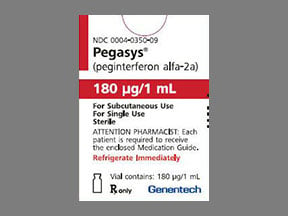
Pegasys Coupons & Savings Card – Discount Prices from $1085.90
My prescription
Edit
1ML of 180MCG/ML, Pegasys (1 Vial)
Select pharmacy

Albertsons
$1085.90
COUPON PRICE
Walgreens
$1147.73
COUPON PRICE
Walmart
$1163.23
COUPON PRICEPegasys savings card
Show this card to your pharmacist
Albertsons
$1085.90
BIN
ID
PCN
GRP
019876
LHD325A828
CHIPPO
LHX
Powered by
More prescriptions for hepatitis C
More prescriptions for hepatitis C
Price history for Pegasys
1 Vial, 1ML of 180MCG/ML
Average retail price for Pegasys
Average SaveHealth price for Pegasys
Our price history data is based on aggregated prescription data collected from participating pharmacies in America. Our prescription data updates daily to reflect the latest price changes. If you notice a missing data point, it means there wasn't sufficient data available to generate a monetary value for that date.
*Retail prices are based on pharmacy claims data, and may not be accurate when we don't have enough claims.
Pegasys dosage forms
Dosage Quantity Price from Per unit 1ML of 180MCG/ML 1 Vial $1085.90 $1085.90 1ML of 180MCG/ML 2 Vials $2156.81 $1078.40 1ML of 180MCG/ML 3 Vials $3227.71 $1075.90
| Dosage | Quantity | Price from | Per unit |
|---|---|---|---|
| 1ML of 180MCG/ML | 1 Vial | $1085.90 | $1085.90 |
| 1ML of 180MCG/ML | 2 Vials | $2156.81 | $1078.40 |
| 1ML of 180MCG/ML | 3 Vials | $3227.71 | $1075.90 |
What is the drug Pegasys used for?
Pegasys is used for the treatment of chronic hepatitis C and chronic hepatitis B infections. It is an antiviral medication that helps to reduce the amount of virus in the body, which can improve liver function and decrease the risk of complications associated with these infections.
Is Pegasys FDA approved?
Yes, Pegasys (peginterferon alfa-2a) is approved by the U.S. Food and Drug Administration (FDA) for the treatment of certain types of hepatitis.
What does Pegasys treat?
Pegasys is used to treat chronic hepatitis B and chronic hepatitis C infections. It is an antiviral medication that helps to reduce the amount of virus in the body and improve liver function.
Is Pegasys a chemo drug?
Pegasys is not a chemotherapy drug. It is a brand name for peginterferon alfa-2a, which is used primarily to treat certain types of viral infections, such as hepatitis B and C. It works by boosting the immune system to help fight the virus.
What does Pegasys do for the liver?
Pegasys, which contains peginterferon alfa-2a, is used to treat certain types of viral hepatitis, such as hepatitis B and C. It works by boosting the immune system to fight the virus, helping to reduce liver inflammation and damage, and potentially leading to a decrease in viral load. This can help improve liver function and slow the progression of liver disease.
